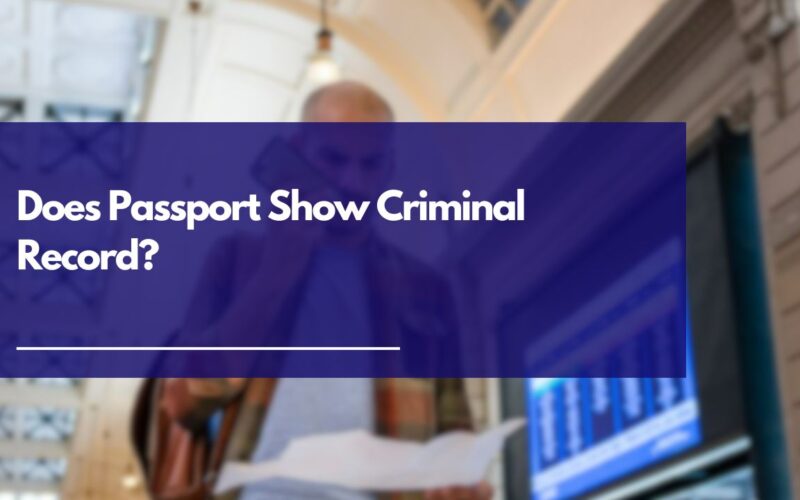As an Amazon Associate, I earn a small commission from qualifying purchases. Learn more about this.
Traveling abroad is a dream for many, but what happens when your past catches up with you—or at least, you fear it might?
One question that bothers prospective travelers is whether their passport reveals their criminal history. In today’s post, we get to the heart of the matter, clarifying what your passport does and doesn’t show.
Does Passport Show Criminal Record?
The question of whether a passport shows a criminal record is one that raises concern for many people.
Let’s get straight to the point: A standard passport does not display your criminal record. Passports are primarily identification documents used to verify your citizenship and grant you access to other countries.
They contain basic personal information like your name, date of birth, nationality, and a photograph. Criminal records, however, are not part of this document.
So why does this question even come up?
The confusion often arises because of the extensive background checks required when applying for or renewing a passport.
The application process does involve a review of your identity and may include a look into your criminal history, especially if you’re applying for a passport for the first time.
But it’s important to note that this background check is more about eligibility for obtaining a passport rather than embedding your criminal history in it.
Now, you might be wondering, can a criminal record affect my ability to get a passport or travel internationally?
The answer is: it depends. For U.S. citizens, for instance, certain types of criminal convictions could result in the denial of a passport application. These often involve drug trafficking charges, particularly those that crossed international borders, or if you owe a substantial amount of child support.
It’s also important to understand that while your passport itself won’t show your criminal record, other systems might.
When you travel internationally, immigration officers often have access to databases that might reveal criminal activity. How this information affects your ability to enter a specific country is up to that country’s regulations and laws.
Some countries are strict about not admitting people with certain types of criminal records, while others might be more lenient.
Additionally, some countries require visas for entry, and the visa application process often involves its own set of background checks. This is another point where a criminal record could impact your travel plans.
Do Countries Share Criminal Records that May Affect Travelling?
So, we’ve established that your passport won’t be a billboard advertising your criminal history. But what about international databases and shared information between countries?
Firstly, it’s important to realize that there’s no global database that lists criminal records accessible to every country.
However, many nations do have bilateral or multilateral agreements to share this kind of information for security reasons. For example, the United States, Canada, and the United Kingdom have data-sharing arrangements that include criminal records.
Now, let’s talk about the Schengen Area, which comprises 26 European countries.
If you’re traveling within this zone, information sharing becomes even more integrated. The Schengen Information System (SIS) allows these countries to exchange data on various matters, including criminal activities, to maintain a certain level of security within the area.
So yes, a criminal record in one Schengen country could potentially affect your entry into another.
But then, just because countries share criminal records doesn’t mean they’ll automatically bar you from entry. Each nation has its own policies about what types of criminal history are considered problematic for incoming travelers.
For example, a minor offense from several years ago may not have much bearing on your travel plans to certain countries, while other nations could have more stringent entry criteria based on criminal records.
In fact, there are still some countries that don’t consider Criminal records.
Can minor Offences be a problem?
The first thing to note is that the term “minor offenses” can mean different things in different jurisdictions.
What might be considered a minor offense in your home country could be viewed differently in another. Even within the same country, various states or provinces may have their own definitions and categorizations for what constitutes a minor offense.

Now, generally speaking, minor offenses are less likely to cause you trouble when you’re crossing borders compared to more serious criminal records.
However, the impact can also be situational. If you have multiple minor offenses, immigration officials in some countries might view this as a pattern of disregard for the law, which could result in entry denial.
But let’s also address another common situation—what if you’ve committed a minor offense in a foreign country?
Often, this will be dealt with under that country’s local laws and may not necessarily impact your ability to return in the future. That said, it could potentially show up in shared databases depending on agreements between countries, as discussed in the previous section.
Moreover, even if the offense is considered “minor,” how recent the offense was could also play a role. Something that happened a decade ago may hold less weight than an offense that occurred just a few months prior to your travel date.
Visa applications are another moment where minor offenses can come into play. While more severe criminal histories are more likely to result in a visa denial, multiple or recent minor offenses could potentially raise red flags, leading to a more complicated application process or even outright denial.
Do Minor Offences Show in Criminal Records?
The visibility of minor offenses in criminal records can vary depending on the jurisdiction and the nature of the offense. Here are some general guidelines, but it’s crucial to consult the laws in your particular jurisdiction for the most accurate information.
United States
In the U.S., minor offenses like misdemeanors and infractions do generally appear on criminal records. However, these are considered less severe than felonies and are usually clearly marked as such on the record.
Some states allow for the expungement or sealing of certain types of misdemeanors after a set period of time or under certain conditions, such as the completion of a diversion program.
United Kingdom
In the UK, minor offenses, known as “summary offenses,” are generally part of your criminal record.
However, these offenses may “filter out” over time, which means they won’t show up on most types of criminal background checks after a certain period has passed.
Canada
In Canada, summary offenses (less serious than indictable offenses) do show up on your criminal record.
However, you may be eligible for a record suspension (previously known as a pardon) after a certain period, usually five years for summary offenses.
Australia
In Australia, minor offenses can appear on your criminal record.
However, each state has different rules for “spent convictions,” which are offenses removed from your criminal record after a certain period of good behavior.
General Notes
In some jurisdictions, minor traffic offenses like speeding tickets may not appear on a standard criminal record check but could show up on a more specialized driving record.
It’s also worth noting that while a minor offense might be part of your criminal record in your home country, it may not necessarily be visible to authorities in other countries unless it’s a matter of international concern or falls under a data-sharing agreement between countries.
Conclusion
In summary, your passport won’t carry the information about your criminal record within its pages. However, a criminal history could affect your ability to obtain a passport in the first place, and it could also impact your ability to travel to certain countries.
It’s always advisable to research the specific entry requirements for the country you wish to visit and consult legal experts if you have concerns about how your criminal record could affect your travel plans.







